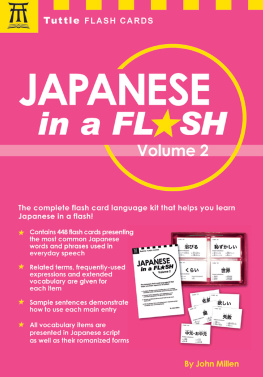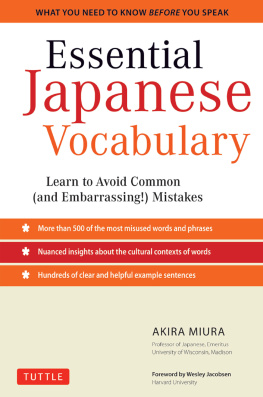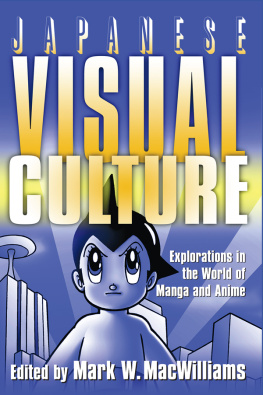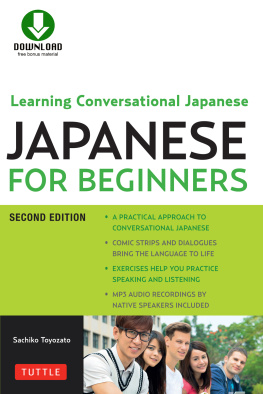Fluent Japanese From Anime and Manga:
How to Learn Japanese Vocabulary, Kanji, and Grammar the Easy and Fun Way
5.6 Edition
Eric Bodnar
Copyright 2018 by Eric Bodnar.
All rights reserved. This book or parts thereof may not be reproduced in any form, stored in any retrieval system, or transmitted in any form by any meanselectronic, mechanical, photocopy, recording, or otherwisewithout prior written permission of the publisher, except as provided by United States of America copyright law.
Table of Contents
Half of the people who see the title to this book might be thinking to themselves, "Learn Japanese by watching anime? What a load of crap!" Such a thing certainly sounds like a crazy pipe dream that a great number of otakus share. And if you watch anime with English subtitles like most of the English speaking world does, this idea will remain merely a dream. You will not learn Japanese outside a small handful of basic words.
If you turned off the English subtitles, however, the situation would be quite different. You would be taking your first steps towards a successful Japanese learning program. Of course, this is not the only step either.
The following steps contained within this book describe a fascinating process of how anyone can teach themselves Japanese to fluency primarily through the material he or she watches and reads for fun. Inside of this book is a system that allows you to learn and never forget thousands of new words, phrases, grammar points, and kanji () that you encounter from any Japanese source of your choice. This includes anime, manga, dramas, movies, videos, music, video games, and visual novels.
Common sense says to learn Japanese mainly from traditional language learning courses and occasionally supplement it with fun things like anime and manga. Then again, you have millions of hopeful Japanese learners who begin studying and drop out when things becomes too dry and boring. This remains true even for many of the most hardcore language learners. I can personally vouch for this statement, as I dedicated four years of my life to rigorously studying Korean while living in South Korea before ultimately burning out and crashing.
I have to also confess that Japanese fiction like anime and manga does use a highly informal and caricatured version of the language. When the student understands the difference between formal and informal Japanese, however, these materials can become a very valuable resource to learn from. Fantasy Japanese contains the same vocabulary, grammar, and kanji found in all Japanese. When you combine this knowledge of Japanese politeness and formalities with the wealth of words and sentence structures that you have acquired from fun materials, you will be able to understand and talk about a large variety of different topics in Japanese whether in casual or polite language.
Perhaps you are wondering, "How long would it take to become fluent in Japanese with this system?" The answer depends on your definition of the word fluent as well as how much time you are willing to put into learning Japanese each day. Do you want to visit Japan and be able to hold basic five-minute conversations with strangers? Do you want to understand everything said in anime and written in manga? Do you want to fall in love with a Japanese person and converse in only Japanese? When you understand how to learn a language the fun and easy way, you will be able to smash all of those goals and go even further than you had previously imagined.
This is not your conventional language textbook that lists topics to study accompanied by new vocabulary and grammar points. You can find hundreds of those in bookstores and across the internet. Rather than dissect and explain a large hodgepodge collection of words and lines from random anime and manga that you may or may not be interested in, this book will show you a system on how to easily learn from any Japanese material of your choice.
Classes Can Be Helpful, But...
But why not just take Japanese language classes and go down the traditional path of learning a foreign language? Learning Japanese from anime and manga seems like a childish excuse to go around the hard work it really takes to learn Japanese to fluency. If you are not willing to go through years of rigorous schooling, it's easy to conclude that you are just not cut out to learn a foreign language.
Learning Japanese or any language seems so complex and difficult, but it is not. Anyone can learn a second language to fluency by using simple yet powerful language learning techniques and given enough time. This might not make any sense if you have ever suffered burnout from foreign language classes in school or at a university. They can make languages seem boring and convoluted.
Foreign language classes teach you about languages, but they do not teach you how to learn a language. After lectures and lengthy explanations, you are left to your own study devices to memorize and absorb massive amounts of information in your head. Old-fashioned study methods say to memorize vocabulary lists, do workbooks, reread old passages, and repeatedly listen to the same audio tracks found in the coursebook CDs. It can be extremely dull at times and expensive as well, but if you are studious enough, you will finish and graduate.
Even upon graduation, however, you will find that school alone does not train our minds to understand the wide variety of vocabulary, sentence structures, and seemingly blazing fast speed that native speakers use in real life. To truly reach an advanced level in a foreign language, more work is required. Classes aren't enough.
The Language Learning Bubble
Doing even a small amount of research on the topic of language learning will net you an endless list of tips and techniques, but polyglots or people who speak several languages can offer us some critical insight. Interviewers, news stories, and viral videos with millions of views make polyglots out to be language geniuses, but if we look more closely at their stories rather than their abilities, there is a deeper truth. They often struggle intensely learning their first foreign language, but something finally clicks within the gears of their minds. They learn that first one and go on to easily learn three or four or even more.
Most polyglots weren't always good at learning foreign languages. It's a skill that they develop with each new language they take on. This is why the first one can be such a challenge for everybody. Without that language learning skill and experience, trying to learn and memorize thousands of Japanese words, phrases, and grammar structures can seem like the ultimate test. And then, native speakers spit all of this out at seemingly a bazillion words a minute. It certainly sounds like a lot of hard work and study will be needed.
It's hard to argue against the value of hard work. It creates high-quality results. It pushes people to do what they need to do. It gets things done. But in the case of learning a foreign language, hard work can be very misleading.
Beginning language learners might put themselves through hell to learn all of this information. They might try to learn a language like they studied in school. Old-fashioned study methods worked back then, so why can't it work now? Rereading, rewriting, and re-listening to the same vocabulary, sentences, dialogues, and short stories is enough to ace school exams via your short-term memory, but they are not very effective means to learn and retain new language or any kind of information in the long term. They are also tedious and not very fun ways to learn.
Some exercises can be taken to frustrating levels of difficulty with the intention to learn faster. These often have the opposite effect. For instance, you could use flashcards to try to translate entire English sentences into Japanese near-verbatim. They may get you to think in Japanese, but they can be immensely stressful. Stress can be a good thing but not so much for the kind that causes you to lose motivation and take extended time off from learning.
Next page












